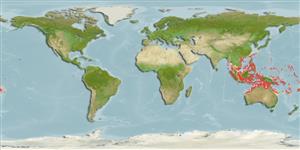Teleostei (teleosts) >
Gobiiformes (Gobies) >
Gobiidae (Gobies) > Gobiinae
Etymology: Amblyeleotris: Greek, amblys = darkness + The name of a Nile fish, eleotris (Ref. 45335).
More on author: Fowler.
Environment: milieu / climate zone / depth range / distribution range
Ecology
Marine; reef-associated; depth range 10 - 40 m (Ref. 86942), usually 10 - 40 m (Ref. 27115). Tropical; 22°C - 28°C (Ref. 27115); 30°N - 24°S, 93°E - 174°W
Western Pacific: Philippines to Tonga, north to the Ryukyu Islands, south to Australia.
Size / Weight / Age
Maturity: Lm ? range ? - ? cm
Max length : 11.0 cm SL male/unsexed; (Ref. 48637)
Dorsal spines (total): 7; Dorsal soft rays (total): 12; Anal spines: 1; Anal soft rays: 12. Characterized by whitish or pale grey color ; 4-5 black to faint brown bars, anterior two much darker than others; head and body with bright orange spots; pelvic fins blackish; eye with black spoke-like markings; prolonged dorsal spines as short filaments; pelvic fins united by membrane at base of fifth soft rays; predorsal scales extending forward to above posterior margin of preopercle; longitudinal scale series 65-70; greatest depth of body 4.5-5.2 in SL; rounded caudal fin (Ref. 90102).
Found in patches or expanses of coarse carbonate sand on outer lagoon and seaward reefs. Inhabits coastal to outer reef sand slopes to 25 meters depth (Ref. 48637).
Life cycle and mating behavior
Maturity | Reproduction | Spawning | Eggs | Fecundity | Larvae
Myers, R.F., 1991. Micronesian reef fishes. Second Ed. Coral Graphics, Barrigada, Guam. 298 p. (Ref. 1602)
IUCN Red List Status (Ref. 130435: Version 2024-1)
Threat to humans
Harmless
Human uses
Fisheries: commercial; aquarium: commercial
Tools
Special reports
Download XML
Internet sources
Estimates based on models
Preferred temperature (Ref.
123201): 25.5 - 28.8, mean 27.6 °C (based on 380 cells).
Phylogenetic diversity index (Ref.
82804): PD
50 = 0.5000 [Uniqueness, from 0.5 = low to 2.0 = high].
Bayesian length-weight: a=0.00724 (0.00339 - 0.01546), b=3.10 (2.92 - 3.28), in cm total length, based on LWR estimates for this (Sub)family-body shape (Ref.
93245).
Trophic level (Ref.
69278): 3.4 ±0.4 se; based on size and trophs of closest relatives
Resilience (Ref.
120179): High, minimum population doubling time less than 15 months (Preliminary K or Fecundity.).
Fishing Vulnerability (Ref.
59153): Low vulnerability (10 of 100).
Nutrients (Ref.
124155): Calcium = 121 [54, 225] mg/100g; Iron = 0.713 [0.365, 1.368] mg/100g; Protein = 17.9 [15.9, 19.6] %; Omega3 = 0.0949 [, ] g/100g; Selenium = 26 [12, 56] μg/100g; VitaminA = 132 [35, 454] μg/100g; Zinc = 1.91 [1.24, 2.84] mg/100g (wet weight);
